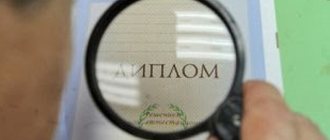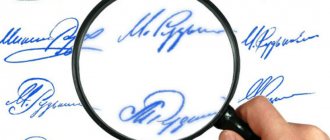What the law says
The Criminal Code of the Russian Federation does not have an article defining punishment specifically for signature forgery. Such offenses are “scattered” across many articles of the law (taking into account the current situation):
- Art. 142 – falsification of election documentation.
- Art. 292 - fraud with official papers.
- Art. 292.1 - illegal transfer of a Russian passport to a citizen of another country.
- Art. 322.2 - illegal registration of a foreign citizen with state registration.
- Art. 324 - sale or purchase of official papers.
- Art. 327 - falsification of official documentation.
In case of violation of the law, persons aged 16 years and older are liable under these articles. To bring the violator to justice, you need the document itself with a falsified signature and the results of an expert assessment.
conclusions
Forgery of a signature is a violation of the current legislation of the Russian Federation. For committing this crime, violators face criminal prosecution. Information on this topic is reflected in Article 327 of the Criminal Code of the Russian Federation.
The nature of the punishment depends on the circumstances under which the violation was committed. Among these, the main one is intent. If a citizen committed a crime thoughtlessly, for example, at the request of a manager, signed for him in an order, he faces a less severe punishment than in a situation where the forgery was committed deliberately.
To confirm the fact of authenticity or counterfeit, you must contact the court or an organization specializing in conducting research of this type. At the end of the investigation, a document with its results is issued.
How is the examination carried out?
If there is suspicion of a forgery, the paper is sent for examination.
The expert assessment function is undertaken by specialists who have the necessary tools and knowledge at hand. If there are significant differences in the signature, an expert assessment may not be assigned, because the crime is easy to prove. There are two types of signature forgery:
- Manual. In this case, the attacker forges another person’s autograph by hand. To identify falsification, the style of writing, the nature of pressure, special curls, and so on are studied. When analyzing such a fake, as a rule, a specialist uses improvised means.
- Technical. In this method of falsification, the attacker uses additional tools.
Technical counterfeiting is carried out in the following ways:
- Redrawing the autograph with a simple pencil and then tracing it with a pen. When determining a forgery, a signature is examined for the presence of preparation for forgery and the features of the signature.
- Copying using glass, carbon paper or by pressing. When analyzing a stroke, the expert pays attention to many factors.
- Use of MFO (laser, scanner) or PC. A counterfeit is detected if there are traces of printing.
- Transferring ink from an original to a craft using photo paper, egg white or other tools. The expert pays attention to color, the presence of foreign traces, and relief.
After studying the signature, specialists issue a conclusion in which they indicate the object of study, the equipment used, the methods and tools used. In addition to the conclusion, drawings with explanations may be attached. A prerequisite is the presence of conclusions and results of the study.
With the advent of new technical means, the level of production of counterfeit signatures is increasing, which are becoming increasingly difficult to detect. That is why it is becoming less and less possible to bring the offender to justice. If necessary, the court has the right to appoint a commission examination, the peculiarity of which is to involve several specialists.
How to recognize a forged signature and why it is dangerous
But with the emergence of new threats and dangers, the old ones have not gone away, including forgery of a handwritten signature. Meanwhile, the signature has a special meaning, and the meaning is the most practical - it, sometimes without seals and stamps, confirms the authenticity of the signed agreement, receipt, order or other document.
No matter how falsifiers have been punished in all centuries, no matter how much torture and sanctions they have been subjected to, there are no fewer fakes, they simply change with the times. The only thing that was definitely achieved was the perception of the word “fake”, especially when it comes to forging a signature, as an exclusively negative event. This word is perceived as something criminal or, at least, illegal.
But in fact, not every imitation of someone else’s signature is socially dangerous and criminally punishable, and some do not entail negative consequences at all. Rather, on the contrary – drawing other people’s signatures is now common, one might even say, an everyday phenomenon. And this is not a spirit of the times, but something that our grandfathers also sinned with if they happened to study at school. After all, as long as the school diary exists, careless students sign in it for their parents called to school. However, young cunning children will not be sent to the dock for such tricks.
You can encounter harmless fakes in adult life. For example, when, at the request of fellow workers, they receive their salaries, of course, by signing the payroll. And such an act becomes criminal only on the condition that the money does not reach the person who earned it.
What about work colleagues! Managers are often completely calm about their subordinates forging their signatures, or even ask them for this favor, just so as not to come to work because of the need to just put a pen stroke on an insignificant document. Thus, in one of the departments of the Ministry of Internal Affairs, where the author happened to work some time ago, in the absence of the boss, his signature (with his consent) was skillfully copied by one of the ordinary employees. On this occasion, the boss himself, proud of the extraordinary abilities of his subordinate, said more than once that he could not distinguish his signature from the one reproduced by this employee.
By the way, there are also situations when people sign for the boss without his knowledge. So we have to increase our vigilance. A familiar manager of one small company said that he discovered the fact of such arbitrariness of an employee due to the fact that he uses a unique signature to sign each type of document, that is, he signs orders for the enterprise with a “squiggle”, financial documents with a more legible signature with a transcript, etc. And the employee he exposed did not know about this secret trick of the boss.
In general, you can’t go over all the options for a relatively harmless and, again, relatively harmless imitation of someone else’s signature, and there’s no need to. The main thing is that such pranks do not lead to the dock, although they do not exclude punishment with a “belt”, reprimand, dismissal, tax audit, etc. depending on the specific situation.
But if the signature was drawn from selfish motives, then its legal assessment becomes different. Depending on the direction of the attacker’s intent and the harm caused by him, it is already determined by the Criminal Code of the Russian Federation (hereinafter referred to as the Criminal Code of the Russian Federation). The Criminal Code of the Russian Federation provides for criminal liability directly for forgery of documents only in isolated cases, for example:
- in Art. 142 “Falsification of election documents, referendum documents, all-Russian voting documents”;
- Art. 233 “Illegal issuance or forgery of prescriptions or other documents giving the right to receive narcotic drugs or psychotropic substances”;
- Art. 327 “Forgery, production or circulation of counterfeit documents, state awards, stamps, seals or forms.”
But investigative and judicial practice indicates that more often counterfeiting is considered not as an independent element of a crime, but as a method of committing crimes. For example, the commission of a significant part of fraud (Article 159 of the Criminal Code of the Russian Federation) became possible only thanks to a well-fabricated signature on a document.
Punishments for all these articles vary greatly. It turns out that the measure of responsibility rather depends on the purposes for which the signature and documents were forged.
Criminal case
When deciding on the need to open a case, representatives of law enforcement agencies pay attention to the characteristics of the criminal act, as well as the presence of personal (selfish) interest. Attention is paid to the content of the paper and its contents. For example, if an employee signs a 2-personal income tax form instead of a manager, but the document reflects true information, no one will be held accountable under the Criminal Code of the Russian Federation. In case of distortion of information, the attacker is punished under the Criminal Code of the Russian Federation, Article 292.
During the consideration of the case, attention is paid to the position of the attacker, the purpose of the paper and the acquisition of any rights when drawing up documents. In the latter case, a forged signature may confirm a license, patents, driver's or pension license, power of attorney, diploma or other educational documents. If the paper provides benefits, the guilty party is liable under the Criminal Code of the Russian Federation. Once a person has forged a signature on an official document, a criminal act is committed.
Features of the crime
Criminals use various methods of forging signatures to certify a particular document. The motive of this crime is to obtain benefits, which this document will contribute to.
This crime involves imitating the signature of an official or another citizen in a document that is directly related to him. Forgery of a signature is carried out in two ways:
- imitate handwriting;
- copy the original using specialized equipment.
Criminal penalty
In most cases, forging a signature entails a suspended sentence for the attacker. For people in positions who use counterfeiting for personal gain, more stringent measures are provided. In such situations there is a high risk of going to prison.
Not all criminal cases involving falsification of strokes reach the judiciary. In most cases, a person loses his place of employment, which allows him to avoid difficulties with the police.
The Criminal Code of the Russian Federation (Article 327) provides for the following consequences for falsifying an autograph . The document is divided into three parts:
- Falsification of a certificate granting additional rights or exemption from obligations, as well as falsification of stamps, seals, awards and other official papers is punishable by restriction of freedom (up to 2 years), forced labor (up to 2 years), arrest (up to six months) or prison (up to 2 years).
- The above actions are intended to conceal the committed criminal act. This includes forced labor (up to 4 years) or prison (up to 4 years).
- Use of deliberately false documentation. In such circumstances, the attacker is punished with a fine of up to 80,000 rubles. or in the amount of salary (other income) for a period of up to six months. More severe punishments include compulsory labor (up to 20 days), correctional labor (up to 2 years), arrest (up to 6 months).
Statute of limitations for the crime
If an attacker forged a signature, which resulted in a crime of mild severity, and this was not noticed for 2 years, due to the expiration of the statute of limitations, he cannot be prosecuted under the articles of the Criminal Code. If the forged signature constitutes a crime of high gravity, then 6 years must pass for the statute of limitations to expire.
A forged signature discovered after 6 years cannot be a reason for liability for its forgery.
However, you should not rejoice at those who forge signatures on documents. If the forgery entailed related crimes that led to negative consequences, and which have a different statute of limitations, he can answer for them to the fullest extent of the law.
When can you avoid punishment?
Cases of forgery of signatures are common and occur in many areas of activity. Some people (for example, managers) themselves ask for an autograph when it is not possible to sign it yourself. Relatives can also make such a request when receiving a parcel or other shipment. The reasons may be different - the inability to personally sign an autograph, a broken arm, and so on.
According to the law, valuable items must be handed over personally to the recipient. Transferring the parcel to an unauthorized person is prohibited. As for forging a signature, this action is illegal. It is prohibited to sign instead of someone else. But no one will investigate the offense until a complaint is filed with law enforcement agencies. If there is no such appeal, then no one will open a case. Postal workers meet the client halfway and do him a favor. That is why no one suffers from such an offense.
Another option for legal falsification of a signature is a facsimile . We are talking about a special stamp on which there is an imprint of the signature of a person, for example, an official. The production of such a stamp is carried out upon receipt of permission from the owner of the signature. The use of the tool is necessary to perform job duties, and its use by subordinates is clearly specified in the job descriptions of employees.
Having a facsimile significantly saves time and increases the amount of work performed. Many bureaucratic difficulties associated with attracting a direct supervisor to sign documents are eliminated. When drawing up an agreement between business partners, it is better to indicate in the papers the possibility of using a facsimile.
If there is no such mark in the contract, the execution of official documents using such a signature may be regarded by the second party, and subsequently by the judicial authority, as a forgery. In this case, the document is declared invalid with all the ensuing consequences. It is also necessary to prepare a list of papers on which facsimile printing is used.
It is prohibited to use such a tool when signing primary documentation (for example, reports from the accounting department), work acceptance certificates, powers of attorney and payment documentation. It is prohibited to put a “stamped” signature on invoices. Otherwise, the company will not be able to claim VAT for deduction.
Additional counterfeit options
A common offense is forging the signature of teachers by students, for example, on a report sheet or record book. Despite the existence of a crime, universities rarely file a complaint with a judicial authority. As a rule, the violator is expelled from the university or forced to take the exams again.
Falsification of autographs on employment papers is no less common. If an employee falsifies documents to obtain any benefit, he is likely to lose his job. If there is an offense on the part of the employer (for example, forging an employee’s signature during the dismissal process), the employee has the right to seek protection in the courts. The downside is that it is not always possible to protect your rights.
The reason is that the employer submits to the court a complete package of papers about the employee’s failure to fulfill his obligations. Such documentation is falsified, but the documents bear the signatures of employees, so it is difficult to dig into them.
Forgery of signatures on documents: responsibility
The degree of responsibility for this crime will depend on:
- the type of document on which the forged signature was placed;
- the purpose for which the forgery was committed;
- consequences that occurred as a result of the offense.
The criminal will be tried for fraud if he misled other citizens by his actions. This could happen in order to appropriate someone’s property by forging a signature, or to acquire the right to real estate.








